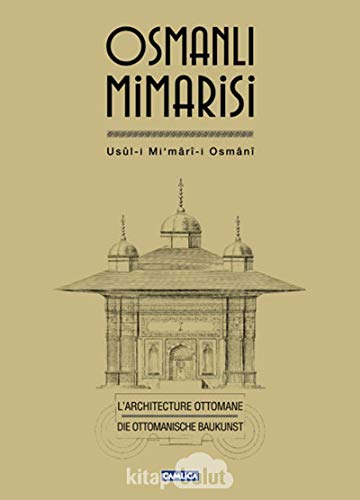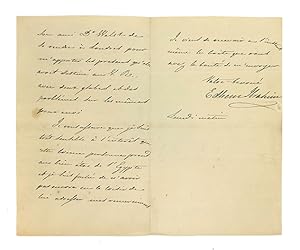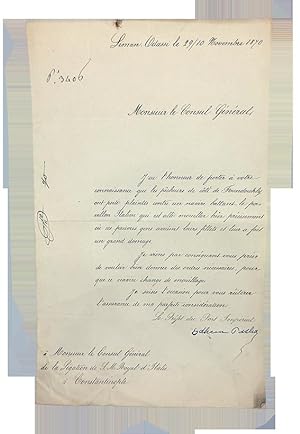Ibrahim Edhem Pasha (6 results)
Product Type
- All Product Types
- Books (2)
- Magazines & Periodicals
- Comics
- Sheet Music
- Art, Prints & Posters
- Photographs
- Maps
- Manuscripts & Paper Collectibles (4)
Condition
Binding
Collectible Attributes
Free Shipping
- Free US Shipping
Seller Location
Seller Rating
-
Osmanli mimarisi. Usûl-i mi'mârî-i Osmâni.= L'Architecture Ottomane.= Die Ottomanische Baukunst. Prep. by Rasit Gündogdu, Ilhan Ovalioglu, Cevat Ekici, Ebul Faruk Önal.
Published by Çamlica Basim Yayin, Istanbul, 2010
ISBN 10: 6054421204ISBN 13: 9786054421206
Book
Hardcover. Condition: New. Original bdg. HC. 4to. (32 x 21 cm). In Turkish, French, and German. [xv], 48 p. text in Turkish; vii, 86, [1] p. text in German and French, 191 plts. (14 plates are in color); 92 p. transcription of the Ottoman text; 58 p. text in Ottoman script. (256 p.)., b/w and color ills. Osmanli mimarisi. Usûl-i mi'mârî-i Osmâni.= L'Architecture Ottomane.= Die Ottomanische Baukunst. Prep. by Rasit Gündogdu, Ilhan Ovalioglu, Cevat Ekici, Ebul Faruk Önal. This book was prepared by a commission headed Ibrahim Edhem Pasa (1818-1893) in 1873 as in French, German and Ottoman Turkish to introduce the Ottoman architectural art style in Vienna Exhibition. This illustrated edition and reprint of 1873 edition is a very important source for architects, engineers, manufacturers of tiles and porcelains and other amateurs. A heavy volume. Reprint of [H] 1290 / [G] 1873 Constantinople edition.
-
[Business card of Ibrahim Edhem Pasha -Müsir-].
Published by [ca. 1890], [Istanbul], 1890
Manuscript / Paper Collectible
Soft cover. Condition: Very Good. Original business card. Slightly chipped left bottom corner. In Ottoman script. Ibrahim Edhem Pasha, (1819-1893) was an Ottoman statesman, who held the office of Grand Vizier in the beginning of Abdul Hamid II's reign between 5 February 1877 and 11 January 1878. He served numerous administrative positions in the Ottoman Empire including minister of foreign affairs in 1856, then ambassador to Berlin in 1876, and to Vienna from 1879 to 1882. He also served as a military engineer and as Minister of Interior from 1883 to 1885. In 1876-1877, he represented the Ottoman Government at the Constantinople Conference. Ibrahim Edhem Pasha was the father of Osman Hamdi Bey, a well-known archaeologist and painter, as well the founder of the Istanbul Archaeology Museum and the Mimar Sinan Fine Arts University. Another son, Halil Edhem Eldem took up the archaeology museum after Osman Hamdi Bey's death and has been a deputy for ten years under the newly founded Turkish Republic. Yet another son, Ismail Galib Bey, is considered as the founder of numismatics as a scientific discipline in Turkey. Later generations of the family also produced illustrious names. The architect Sedat Hakki Eldem, a cousin, is one of the pillars of the search for modern architectural styles adopted by the Republic of Turkey (called the Republican style in the Turkish context) in its early years and which marks many important buildings dating from the period of the 1920s and the 1930s. A great-grandson, Burak Eldem, is a writer while another, Edhem Eldem, is a renowned historian. More names include Erol Eldem, Tiana Eldem, Levent Eldem and Ercan Eldem, an architect. (Source: Wikipedia).
-
Autograph document / letter signed 'Halil', addressed to Köprülüzâde [Mehmed] Fuad, (1890-1966), requesting the return of books (listed on letter) borrowed from the museum's library.
Published by "Müze-yi Humâyûn" [i.e. Imperial Museum] Letterhead - Dated AH fî 19 Tesrîn-i Evvel [1]332, Istanbul, 1916
Manuscript / Paper Collectible Signed
Soft cover. Condition: Very Good. Original manuscript autograph letter/document signed by Halil Edhem Eldem as the director of Müze-yi Humâyûn [i.e. The first Ottoman / Turkish Archaeological Museum] sent to Mehmed Fuaad Köprülü, (1890-1966), requesting the return of books (listed on letter) borrowed from the museum's library. 35x21 cm. In Ottoman script. Includes 10 lines. Water stain on a big area on the paper. The script is fine and legible. A couple of punch-holes on the left side. Otherwise a good paper. Mentioned books are written at the beginning of the letter as a list: 1. Mongol history in French. 2. Jornal Azbatin (?). 3. Hun tarihi [i.e. History of Huns]. 4. A manuscript on the Ottoman geography. An interesting and rare manuscript. Halil Bey is an important figure in Turkish cultural history who operated in the late Ottoman period and the beginning of the Republic period. As he was the head of the Asari Atîka Museum, he was mostly interested in ancient works, but also worked on Turkish-Islamic inscriptions and coins. Halil Bey, who made important contributions to the development of Turkish museums, made efforts to collect and publish hundreds of inscriptions in Anatolia and to protect and restore Turkish architectural works. Signed by Author(s).
-
Autograph letter signed 'Edhem Ibrahim' in French.
Published by ALS Manuscript in French., Dated Feb(?), 18, 1839, 1839
Manuscript / Paper Collectible Signed
Soft cover. Condition: Very Good. Original autograph manuscript letter signed (ALS) 'Ibrahim Edhem'. 18x12 cm. In French. 3 p. on bifolium. To an unnamed recipient, mentioning a Mme. M. Neville, her interest in Egypt, and acknowledging receipt of a parcel. 2 1/2 sides 8vo, no place or date but dated 1839 to the reverse; usual. Ibrahim Edhem Pasha, (1819-1893) was an Ottoman statesman, who held the office of Grand Vizier at the beginning of Abdul Hamid II's reign between 5 February 1877 and 11 January 1878. He resigned from that post after the Ottoman chances of winning the Russo-Turkish War (1877-1878) had decreased. He furthermore served in numerous administrative positions in the Ottoman Empire including minister of foreign affairs in 1856, then ambassador to Berlin in 1876, and to Vienna from 1879 to 1882. He also served as a military engineer and as Minister of Interior from 1883 to 1885. In 1876-1877, he represented the Ottoman Government at the Constantinople Conference. Ibrahim Edhem Pasha was the father of Osman Hamdi Bey, a well-known archaeologist, and painter, as well as the founder of the Istanbul Archaeology Museum and the Mimar Sinan Fine Arts University. Another son, Halil Edhem Eldem took up the archaeology museum after Osman Hamdi Bey's death and has been a deputy for ten years under the newly founded Turkish Republic. Yet another son, Ismail Galib Bey, is considered as the founder of numismatics as a scientific discipline in Turkey. Signed by Author(s).
-
Autograph letter signed, in French, addressed to 'Monsieur la Consul General de la Legation de S. M. Royal d'Italie a Constantinople'. Greek born Turkish statesman, Grand Vizier 1878).
Published by Liman Odasi le 29/10 Novembre 1870, Constantinople, 1870
Manuscript / Paper Collectible Signed
Soft cover. Condition: Very Good. Original manuscript letter / document signed by Edhem Pasha sent to Italian ambassador in Constantinople. 35x22 cm. In French. 18 lines. Bifolium. 1 p. "Monsieur le Consul Général, J'ai l'honneur de porter a votre connaissance que le pecheurs de côte de Foundoukly ont porte plaintes contre un navire battant le pavillion Italien qui est alle mouiller hier precisement ou ces pauvres gens avaient leurs fillets et leur a fait un grand domage. Je viens par conséquent vous prier de vouloir bien donner des ordres necessaires, pour que ce navire change de mouillage. Je saisis l'occasion pour vous reiterer l'assurance de ma parfaite consideration. Le prefet du Port Imperial. It's English translation is "Mr. Consul General, I have the honor to bring to your knowledge that the fishermen of the coast of Foundoukly lodged a complaint against a ship flying the Italian flag which went to anchor yesterday precisely where these poor people had their daughters and made them a great shame. I therefore come to ask you to give the necessary orders for this vessel to change its anchorage. I take this opportunity to reiterate the assurance of my full consideration. The prefect of Port Imperial.". Ibrahim Edhem Pasha, (1819-1893) was an Ottoman statesman, who held the office of Grand Vizier in the beginning of Abdul Hamid II's reign between 5 February 1877 and 11 January 1878. He resigned from that post after the Ottoman chances on winning the Russo-Turkish War (1877-1878) had decreased. He furthermore served numerous administrative positions in the Ottoman Empire including minister of foreign affairs in 1856, then ambassador to Berlin in 1876, and to Vienna from 1879 to 1882. He also served as a military engineer and as Minister of Interior from 1883 to 1885. In 1876-1877, he represented the Ottoman Government at the Constantinople Conference. Ibrahim Edhem Pasha was the father of Osman Hamdi Bey, a well-known archaeologist and painter, as well the founder of the Istanbul Archaeology Museum and the Mimar Sinan Fine Arts University. Another son, Halil Edhem Eldem took up the archaeology museum after Osman Hamdi Bey's death and has been a deputy for ten years under the newly founded Turkish Republic. Yet another son, Ismail Galib Bey, is considered as the founder of numismatics as a scientific discipline in Turkey. Signed by Author(s).
-
[THE MEASURE OF THE OVERSEAS TOWNS: GUIDE FOR THE MARINERS FROM BATUMI TO AFRICA] Eb'ad-i buldân cedveli: Bahr-i Siyah'da kâin Batum'dan Ingiltere'ye kadar Avrupa, Asya ve Afrika sevâhillerinde bulunan mesâhir-i beledânin arz ve tûlleriyle birbirlerine olan bu'd-i mesafelerini hâvi eb'ad-i beledân cetvelidir.
Published by Mekteb-i Bahriye Matbaasi [i.e. The Naval School Printing House]., [AH 1288], Istanbul, 1871
Book First Edition
Hardcover. Condition: Very Good. 1st Edition. Original cloth bdg. with marbled boards. Cr. 8vo. (20 x 13,5 cm). In Ottoman script (Old Turkish with Arabic letters). 176, [1] p. Lithographed edition. Extremely rare first and only edition of this guide to the distances and meridian calculations of some cities from Batumi located on the shores of Black Sea, Europe until Great Britain, Asia, and Africa shores, prepared for Turkish naval officers, mariners, and vessels, describing the shores of the countries located on these routes. ABOUT THE AUTHOR: Ibrahim Edhem Pasha was an Ottoman statesman, who held the office of Grand Vizier at the beginning of Abdul Hamid II's reign between 5 February 1877 and 11 January 1878. He resigned from that post after the Ottoman chances of winning the Russo-Turkish War (1877-1878) had decreased. He furthermore served in numerous administrative positions in the Ottoman Empire including minister of foreign affairs in 1856, then ambassador to Berlin in 1876, and to Vienna from 1879 to 1882. He also served as a military engineer and as Minister of Interior from 1883 to 1885. In 1876-1877, he represented the Ottoman Government at the Constantinople Conference. He was born in Chios of Greek ancestry, in a Christian Greek Orthodox village on the island of Chios. Strangely, his connection to Chios is not well-documented: his son Osman Hamdi Bey claimed that he was a member of the Scaramanga family, but Edhem Pasha himself tried to efface his Greek connections. As a young boy in 1822, he was orphaned and captured by Ottoman soldiers during the massacre of the Greek population of Chios. He was sold into slavery, brought to Constantinople, and adopted by the (later) grand vizier Hüsrev Pasha. Lacking his own children and family, Hüsrev Pasha raised about ten children who had been orphaned or bought as slaves, many of whom ascended to important positions. The child, now named Ibrahim Edhem, quickly distinguished himself with his intelligence and after having attended schools in the Ottoman Empire, he was dispatched along with a number of his peers, and under the supervision of his father, then grand vizier, and of the sultan Mahmud II himself, to Paris to pursue his studies under state scholarship. There he returned with a Bachelor of Arts and was one of the top pupils at the École des Mines. He was a classmate and a friend of Louis Pasteur. He thus became Turkey's first mining engineer in the modern sense, and he started his career in this field. Edhem Pasha was the father of Osman Hamdi Bey, a well-known archaeologist, and painter, as well as the founder of the Istanbul Archaeology Museum and the Mimar Sinan Fine Arts University. Another son, Halil Edhem Eldem took up the archaeology museum after Osman Hamdi Bey's death and has been a deputy for ten years under the newly founded Turkish Republic. Yet another son, Ismail Galib Bey, is considered the founder of numismatics as a scientific discipline in Turkey. Later generations of the family also produced illustrious names. The architect Sedat Hakki Eldem, a cousin, is one of the pillars of the search for modern architectural styles adopted by the Republic of Turkey (called the Republican style in the Turkish context) in its early years and which marks many important buildings dating from the period of the 1920s and the 1930s. A great-grandson, Burak Eldem, is a writer while another, Edhem Eldem, is a renowned historian. More names include Erol Eldem, Tiana Eldem, Levent Eldem, and Ercan Eldem, an architect. (Source: Wikipedia). Özege 4522.; Only one copy in OCLC: 162837008 (Bayerische Staatsbibliothek).




![Seller image for Autograph document / letter signed 'Halil', addressed to Köprülüzâde [Mehmed] Fuad, (1890-1966), requesting the return of books (listed on letter) borrowed from the museum's library. for sale by Khalkedon Rare Books, IOBA](https://pictures.abebooks.com/inventory/md/md30772703375.jpg)


![Seller image for [THE MEASURE OF THE OVERSEAS TOWNS: GUIDE FOR THE MARINERS FROM BATUMI TO AFRICA] Eb'ad-i buldân cedveli: Bahr-i Siyah'da kâin Batum'dan Ingiltere'ye kadar Avrupa, Asya ve Afrika sevâhillerinde bulunan mesâhir-i beledânin arz ve tûlleriyle birbirlerine olan bu'd-i mesafelerini hâvi eb'ad-i beledân cetvelidir. for sale by Khalkedon Rare Books, IOBA](https://pictures.abebooks.com/inventory/md/md31312968792.jpg)